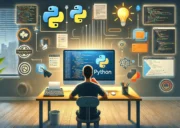There aren’t many Eltons working in the Docker space, but if there were, Mr Stoneman would still be making a name for himself.
As a developer advocate, his job is to go out into the community and spread the word about the virtues of Docker and what it can do. And, given its success, it seems people are listening.
So, what has he got to say?
“It just makes this stuff so easy. So, what Docker does with containers, that’s been around for 20 years. But it was impossibly hard, like you had to have a PhD in understanding all this stuff and you had to understand how it worked and things that people just don’t want to touch because I work here, this is my application, I don’t want to go right down here to find out how things work. Docker just made that super easy. That’s what Docker gives you and that’s what we love.”
“It lifts all that communication logic and puts it into one central component, which means you can control how all your components communicate centrally, so you can do things like routing traffic to different locations, you can do security between nodes, secure encryption between nodes, you can do customised routing for different users and you can do it centrally. So that’s the power it gives you.”
Moving from a monolith to distributed architecture brings many challenges, says Elton.
“The biggest difficulty in actually taking my existing monolith and making it into a distributed architecture is finding out where to cut it. Which bit makes sense to cut out and put it there? Finding a way to make those cuts and whether to do a pragmatic approach of saying I understand my application, I’m going to find the pain points and put those in separate pieces or whether you do it with a more abstract way of saying here are the logical contexts. That’s the hardest part.”
“It just makes this stuff so easy. So, what Docker does with containers, that’s been around for 20 years. But it was impossibly hard, like you had to have a PhD in understanding all this stuff and you had to understand how it worked and things that people just don’t want to touch because I work here, this is my application, I don’t want to go right down here to find out how things work. Docker just made that super easy. That’s what Docker gives you and that’s what we love.”



